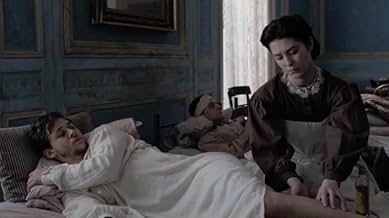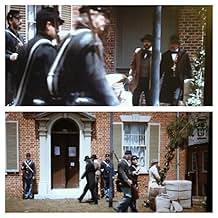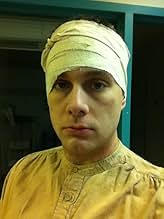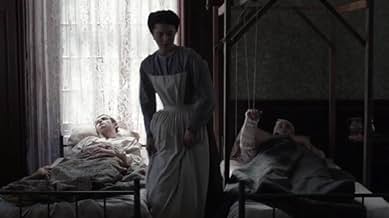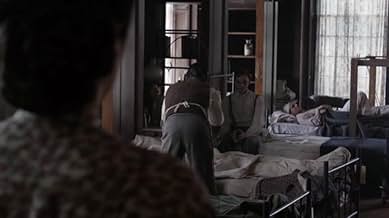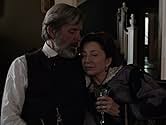Sigue las vidas de dos enfermeras voluntarias en bandos opuestos de la Guerra Civil - la abolicionista de Nueva Inglaterra Mary Phinney y la partidaria confederada Emma Green.Sigue las vidas de dos enfermeras voluntarias en bandos opuestos de la Guerra Civil - la abolicionista de Nueva Inglaterra Mary Phinney y la partidaria confederada Emma Green.Sigue las vidas de dos enfermeras voluntarias en bandos opuestos de la Guerra Civil - la abolicionista de Nueva Inglaterra Mary Phinney y la partidaria confederada Emma Green.
- Premios
- 1 premio ganado en total
Explorar episodios
Opiniones destacadas
I had high hopes for Mercy Street. Fictionalized history has become increasingly popular in recent years, and this show had potential to be one of the more memorable ones, with a previously untapped setting and a cast full of talented actors. Sadly, the show has turned out to be mostly unremarkable.
The basic premise is simple: a widowed woman is sent to become head nurse at a military hospital converted from a hotel in Union-occupied Alexandria, Virginia. On top of this premise, the show's writers have piled enough dramatic crises and neurotic characters to populate a full soap opera. Everyone is constantly shouting at each other and plotting behind each other's backs.
Given the setting, conflict and friction is understandable, and of course a drama needs, well, drama. But with only six episodes, they've created enough plot lines to easily fill a US-standard 22-episode season, if not more. Everything is just so busy that the only way we learn anything about the characters is through their conflicts. Calm moments are few and far between. Most performances border on scenery- chewing, except of course when they jump well past that border.
That said, there are a number of things to enjoy. Mary Elizabeth Winstead, always a treat, seems so comfortable with the trappings of the period you'd think she was born into it. Donna Murphy is exquisite as the quintessential Southern matriarch, turning borderline overacting into a virtue. Tara Summers has channeled all the snarky disdain of Alan Rickman while Jack Falahee is the spitting image in looks and charm of a young Johnny Depp. Gary Cole, one of the few cast members not constantly gnaw at the walls, adds just enough temper to his usual near-deadpan dryness to be a realistic Southern businessman trying to hold onto what little he has left after the Union takes everything.
The real surprise, though, is Josh Radnor. If you've only seen him in How I Met Your Mother, you'd have no idea that he's capable of the quietly powerful performance he turns in here. Yes, he does spend a lot of time chomping on the set, but he balances that with more subtle moments that reveal significant talent he hasn't had much opportunity to utilize. In many ways, he reminds me of Mandy Patinkin in his younger days.
Ultimately, the show is entertaining enough to be worth watching if you like fictionalized history. Just don't expect more from it than it is.
The basic premise is simple: a widowed woman is sent to become head nurse at a military hospital converted from a hotel in Union-occupied Alexandria, Virginia. On top of this premise, the show's writers have piled enough dramatic crises and neurotic characters to populate a full soap opera. Everyone is constantly shouting at each other and plotting behind each other's backs.
Given the setting, conflict and friction is understandable, and of course a drama needs, well, drama. But with only six episodes, they've created enough plot lines to easily fill a US-standard 22-episode season, if not more. Everything is just so busy that the only way we learn anything about the characters is through their conflicts. Calm moments are few and far between. Most performances border on scenery- chewing, except of course when they jump well past that border.
That said, there are a number of things to enjoy. Mary Elizabeth Winstead, always a treat, seems so comfortable with the trappings of the period you'd think she was born into it. Donna Murphy is exquisite as the quintessential Southern matriarch, turning borderline overacting into a virtue. Tara Summers has channeled all the snarky disdain of Alan Rickman while Jack Falahee is the spitting image in looks and charm of a young Johnny Depp. Gary Cole, one of the few cast members not constantly gnaw at the walls, adds just enough temper to his usual near-deadpan dryness to be a realistic Southern businessman trying to hold onto what little he has left after the Union takes everything.
The real surprise, though, is Josh Radnor. If you've only seen him in How I Met Your Mother, you'd have no idea that he's capable of the quietly powerful performance he turns in here. Yes, he does spend a lot of time chomping on the set, but he balances that with more subtle moments that reveal significant talent he hasn't had much opportunity to utilize. In many ways, he reminds me of Mandy Patinkin in his younger days.
Ultimately, the show is entertaining enough to be worth watching if you like fictionalized history. Just don't expect more from it than it is.
(I hope what I have written is not considered spoilers - I would not do that intentionally!)
I understand a lot of the criticisms written in these reviews. My reaction to watching Episode 1 was "What is this? Desperate Housewives of Civil War Medicine??" - because it seemed so "overheated" and unbelievable. For example, when Nurse Phinney has to sleep on the floor of the ward among the soldiers' beds, I exclaimed, "That didn't happen! That would never have happened! But then I started to read the true story of Nurse Phinney, "Adventures of an Army Nurse in Two Wars" and guess what - it DID happen plus a whole lot more!
What I saw as "overheated" in terms of the drama between hospital personnel was actually DOWNPLAYED from the true reality!!! The surgeons and doctors did NOT want female nurses around and wanted to drive them OUT. The hospital WAS as chaotic, as shown. And as far as soldiers not being fed - YUP, it was only TOO TRUE!!! There was a shocking amount of graft and profiteering going on in the food supply chain! I highly recommend the true story of Nurse Phinney - it is quite a read!!
I understand a lot of the criticisms written in these reviews. My reaction to watching Episode 1 was "What is this? Desperate Housewives of Civil War Medicine??" - because it seemed so "overheated" and unbelievable. For example, when Nurse Phinney has to sleep on the floor of the ward among the soldiers' beds, I exclaimed, "That didn't happen! That would never have happened! But then I started to read the true story of Nurse Phinney, "Adventures of an Army Nurse in Two Wars" and guess what - it DID happen plus a whole lot more!
What I saw as "overheated" in terms of the drama between hospital personnel was actually DOWNPLAYED from the true reality!!! The surgeons and doctors did NOT want female nurses around and wanted to drive them OUT. The hospital WAS as chaotic, as shown. And as far as soldiers not being fed - YUP, it was only TOO TRUE!!! There was a shocking amount of graft and profiteering going on in the food supply chain! I highly recommend the true story of Nurse Phinney - it is quite a read!!
I am greatly enjoying this series. The production has the feel of the period from the mud in the streets, to the period decor of the rooms and costumes, all the way to the amputated limbs being taken away in a wheelbarrow. War is hell, and none was more so than the Civil War, when weaponry had become so efficient as to mow down regiments marching forward in outdated styles of battle. Some viewers might object to bloody surgery scenes. However, one of the most affecting scenes to me was of a Confederate soldier with shell shock who told of the horror of battle, "the smoke and blood and the screaming, you never know where it's coming from."
Soldiers who make it to this hospital are cared for to the best of their abilities by Mary Phinney and Dr. Jedediah Foster, played admirably by Mary Elizabeth Winstead and Josh Radnor. Their own personal dramas are interwoven into the story lines quite well. Applause to the producers and directors!
Soldiers who make it to this hospital are cared for to the best of their abilities by Mary Phinney and Dr. Jedediah Foster, played admirably by Mary Elizabeth Winstead and Josh Radnor. Their own personal dramas are interwoven into the story lines quite well. Applause to the producers and directors!
This series began with real promise - an American period drama along the lines and quality of what Masterpiece has imported from across the pond. And for the most part, the first season delivered.
But the second season devolved into a Grey's Anatomy-style soap (complete with the annoying underscore) that treated the horrors and suffering of the Civil War as a backdrop for quirky characters and their high jinks. The psychological drama never reached deeper than a wading pool.
The real mercy in Mercy Street was putting it out of its misery at the end of the second season.
But the second season devolved into a Grey's Anatomy-style soap (complete with the annoying underscore) that treated the horrors and suffering of the Civil War as a backdrop for quirky characters and their high jinks. The psychological drama never reached deeper than a wading pool.
The real mercy in Mercy Street was putting it out of its misery at the end of the second season.
I'm not sure why any viewer would compare a series set during American revolutionary times (the Civil War) to Downton Abbey. Downton Abbey was simply a remake of the popular (and recently remade) series, Upstairs, Downstairs. It was mostly an entertaining soap about a rich family and their household, but I digress...
First off, all of the actors are well-cast and do suitably good work. It's only been two episodes, so we'll have to wait and see as far as whether any heavy lifting will be required, acting wise. It's safe to say that we should expect to see the transformation of some of the characters, insofar as their beliefs are portrayed. There is a doctor, for example, who has no problem with slavery, but believes that it is his duty to equally treat Union and Confederate soldiers because, "Blood does not run grey or blue, it runs red." The nurse to whom he makes this argument (Nurse Mary/Baroness), is a staunch supporter of the Union and believes that as a Union hospital, Union soldiers can claim priority.
We have familiar faces in this cast - L. Scott Caldwell, Donna Murphy, Gary Cole, Tara Summers, and new ones in Shalita Grant, McKinley Belcher III, and Mary Elizabeth Winstead. While Mercy Street bears some similarity to The Knick due to its setting (a hospital) and a promise of change to come, it is less graphic in its portrayal of the everyday occurrences of the medical world.
With the popularity of Hamilton on today's Broadway stage, Mercy Street is a welcome addition to the TV lineup, as anything that encourages today's American to learn about the past is a boon, indeed.
First off, all of the actors are well-cast and do suitably good work. It's only been two episodes, so we'll have to wait and see as far as whether any heavy lifting will be required, acting wise. It's safe to say that we should expect to see the transformation of some of the characters, insofar as their beliefs are portrayed. There is a doctor, for example, who has no problem with slavery, but believes that it is his duty to equally treat Union and Confederate soldiers because, "Blood does not run grey or blue, it runs red." The nurse to whom he makes this argument (Nurse Mary/Baroness), is a staunch supporter of the Union and believes that as a Union hospital, Union soldiers can claim priority.
We have familiar faces in this cast - L. Scott Caldwell, Donna Murphy, Gary Cole, Tara Summers, and new ones in Shalita Grant, McKinley Belcher III, and Mary Elizabeth Winstead. While Mercy Street bears some similarity to The Knick due to its setting (a hospital) and a promise of change to come, it is less graphic in its portrayal of the everyday occurrences of the medical world.
With the popularity of Hamilton on today's Broadway stage, Mercy Street is a welcome addition to the TV lineup, as anything that encourages today's American to learn about the past is a boon, indeed.
¿Sabías que…?
- TriviaThe real Alice Green actually died a few weeks short of her 15th birthday in early 1860, over a year before the start of the Civil War.
Selecciones populares
Inicia sesión para calificar y agrega a la lista de videos para obtener recomendaciones personalizadas
- How many seasons does Mercy Street have?Con tecnología de Alexa
Detalles
- Fecha de lanzamiento
- País de origen
- Sitios oficiales
- Idioma
- También se conoce como
- Улица милосердия
- Locaciones de filmación
- Laburnum House - 1300 Westwood Avenue, Richmond, Virginia, Estados Unidos(Mansion House Hotel)
- Productoras
- Ver más créditos de la compañía en IMDbPro
Contribuir a esta página
Sugiere una edición o agrega el contenido que falta

Principales brechas de datos
By what name was Mercy Street (2016) officially released in India in English?
Responda



